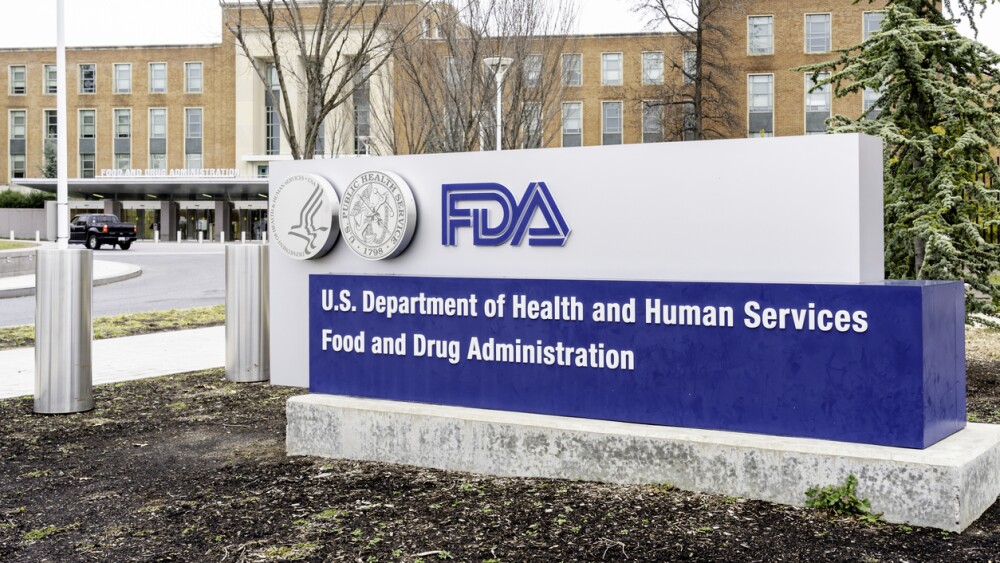The U.S. Food and Drug Administration announced the issuance of two warning letters to operators of websites that illegally market potentially dangerous, unapproved and misbranded opioid medications, including tramadol.
SILVER SPRING, Md., April 2, 2019 /PRNewswire/ -- Today the U.S. Food and Drug Administration announced the issuance of two warning letters to operators of websites that illegally market potentially dangerous, unapproved and misbranded opioid medications, including tramadol. The warning letters issued to azmedicinalshop.com and thedonrx.net request that they immediately cease offering violative drugs for sale to U.S. consumers.

The rise in illegal sales of opioids over the internet is a critical public health concern and major focus of attention by the FDA. These drugs are highly addictive and can be deadly when used without a doctor's supervision. To further advance innovative solutions to protecting Americans from opioids that are illegally being sold online, today the agency is also hosting internet stakeholders, thought leaders, government entities, academic researchers and advocacy groups at its second Online Opioid Summit. The summit will focus on opportunities to reduce the availability of opioids online by working with website registries and registrars, which play an important role in the registration of internet domain names.
"To combat the opioid epidemic, we need to work across all of our authorities to reduce exposure to opioid drugs in the medical setting, advance innovations that can offer non-addictive alternatives for the treatment of pain, promote the development and awareness of therapies that can help those currently addicted to opioids, and target the illegal sale of illicit drugs online and through the mail. The illicit sale of opioids online is a particularly critical concern as the nature of the epidemic shifts from one where new addiction was primarily formed in the medical setting, to a crisis where more and more of the new exposure is through illicit drugs. These drugs are often purchased online and received through the mail," said FDA Commissioner Scott Gottlieb, M.D. "Given the grave consequences of these illegal online sales, we've been aggressively targeting websites illegally offering opioids for sale. Today we added two more actions that now brings our total to 25 warning letters identifying more than 450 websites since September 2017. While we'll continue to identify and take action against violative websites, we know that enforcement action alone is unlikely to stop new websites from starting up. Stopping these websites from illegally offering opioids for sale will require a broad collaboration across the internet community. We're continuing our work with other stakeholders to identify opportunities to reduce the illegal online sale of opioids, including internet companies who've taken concrete steps to combat the illegal sale of opioids through their platforms and services. These partnerships can have a significant impact in the fight against opioid addiction. Already, we've seen a positive impact from this work. Google has begun to deindex websites named in our warning letters that cite the unlawful sale of opioids; social media platforms like Facebook and Instagram have started to redirect users looking to buy opioids to a government help line. We applaud these actions and similar steps being taken, and we look forward to continuing this dialogue in today's meeting. There are still too many consumers who have access to illegal opioid products online, and we'll continue to take steps to target and end these illegal sales."
Opioid addiction is an immense public health crisis. According to the Centers for Disease Control and Prevention, in 2017, opioids killed 47,600 people in the U.S., a 13 percent increase over the number killed in 2016. Addressing this crisis is one of the FDA's highest priorities. Our efforts support the U.S. Department of Health and Human Services' 5-Point Strategy To Combat the Opioid Crisis.
Rogue online pharmacies, drug dealers and others continue to use the internet to illegally promote and sell opioids, where the risk of detection and repercussions is significantly reduced. The FDA is committed to targeting these illegal sales and working with internet stakeholders to advance a proactive approach to cracking down on internet traffic in illicit drugs to address this public health emergency.
The sale of unapproved and misbranded opioids poses heightened dangers to consumers who purchase those products. Patients who buy prescription drugs, including opioids, from illegal online pharmacies may put their health at risk because the products, while being marketed as authentic, may be counterfeit, contaminated, expired or otherwise unsafe. As noted in the warning letters, these websites offer to sell opioids that are misbranded and unapproved new drugs, including unapproved tramadol, in violation of the Federal Food, Drug, and Cosmetic Act. In addition to health risks, illegal online pharmacies can pose other risks to consumers, including credit card fraud, identity theft and computer viruses.
While the agency is concerned about online sales of all the opioid products, the warning letters issued to azmedicinalshop.com and thedonrx.net specifically cite the illegal sale of tramadol. As with all opioids, FDA-approved tramadol has a boxed warning, the FDA's most prominent warning, indicating that the drug carries a significant risk of serious or even life-threatening adverse effects. The boxed warning also addresses risks including addiction, abuse, misuse, life-threatening respiratory depression (breathing problems) and neonatal opioid withdrawal syndrome (withdrawal symptoms in newborn babies). In addition, when taken with other central nervous system depressants, including alcohol, tramadol's use may result in coma or death.
The FDA requested responses from each of the warning letter recipients within 15 working days. They are directed to inform the agency of the specific actions taken to address the violations outlined in the warning letter. Those entities that fail to correct the violations may be subject to further regulatory action.
The FDA remains committed to addressing the national crisis of opioid addiction on all fronts, with a significant focus on decreasing exposure to opioids and preventing new addiction; supporting the treatment of those with opioid use disorder; fostering the development of novel pain treatment therapies and opioids more resistant to abuse and misuse; and taking action against those involved in the illegal importation and sale of opioids. The agency will also continue to evaluate how opioids currently on the market are used, in both medical and illicit settings, and take regulatory action where needed.
For more information:
- FDA: BeSafeRx: Know Your Online Pharmacy
- FDA: How to Buy Medicines Safely from an Online Pharmacy
- FDA: Reporting Unlawful Sales of Medical Products on the Internet
- SAMHSA National Helpline
The FDA, an agency within the U.S. Department of Health and Human Services, protects the public health by assuring the safety, effectiveness, and security of human and veterinary drugs, vaccines and other biological products for human use, and medical devices. The agency also is responsible for the safety and security of our nation's food supply, cosmetics, dietary supplements, products that give off electronic radiation, and for regulating tobacco products.
Media Inquiries: Deborah Kotz, 301-796-5349, deborah.kotz@fda.hhs.gov
Consumer Inquiries: 888-INFO-FDA
![]() View original content to download multimedia:http://www.prnewswire.com/news-releases/fda-takes-new-enforcement-actions-as-part-of-the-agencys-ongoing-effort-to-combat-the-illegal-online-sales-of-opioids-300822962.html
View original content to download multimedia:http://www.prnewswire.com/news-releases/fda-takes-new-enforcement-actions-as-part-of-the-agencys-ongoing-effort-to-combat-the-illegal-online-sales-of-opioids-300822962.html
SOURCE U.S. Food and Drug Administration




